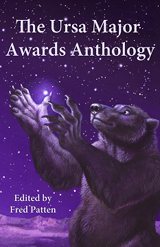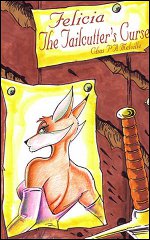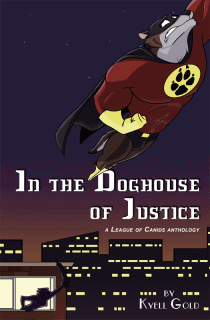Review: 'The Ursa Major Awards Anthology', edited by Fred Patten (by Watts Martin)

Edited by Fred Patten
Cover art by Teagan Gavet and Tess Garman
Trade paperback, 339 pages
FurPlanet Productions, June 2012
This anthology is drawn from the first decade of winners – and in some cases, nominees – for the Ursa Major Awards, furry fandom's rough equivalent to science fiction fandom's Hugo Awards.
The Ursas are a popular vote; any fan can nominate a work in one of several categories, as well as vote on the final ballot. The Ursas started in 2001, organized by longtime fan and editor Fred Patten, who's also the editor of this volume (as well as a frequent reviewer on Flayrah).
Many of the stories feature illustrations from their original publication; all are introduced by Patten.
Compare: The Ursa Major Awards Anthology as reviewed by Roz Gibson, and by dronon.
The first five stories are all from series – apparently, furries love their franchises – and all but one feature strong female protagonists. The opener, "Beneath the Crystal Sea," is from Brock Hoagland's tales of Perissa, a leopardess assassin in a very D&D-ish setting (Patten describes the stories as "frank pastiches of Robert E. Howard's Conan the Barbarian stories"). It's not a bad adventure tale, but given how much Perissa consistently outclasses all her foes there's little suspense, and it requires patience with faux medieval dialogue often focused on men ogling her.
Michael H. Payne's "Familiars" is from a series of stories about Crocker, a student at a magical school, and Cluny, his squirrel familiar — although it turns out Cluny is the actual sorcerer: Crocker has the magical talent of a tulip. Payne is one of the best storytellers in furrydom, and his dialogue and characterization work here are charming. Payne is also the only Ursa winner (rather than nominee) whose work was from a professional publication, Marion Zimmer Bradley's Sword and Sorceress.
M.C.A. Hogarth is known these days for poetic and often challenging explorations of alien cultures; some of her earlier stories were set in a galactic empire that includes "pure" humans and various races descended from bioengineered animals created centuries before by those humans, creating somewhat fraught racial politics.  "In The Line of Duty" has the feel of a solid Star Trek episode from a series that was better than most of the series we actually got. Also, of the several female leads in this collection, Commander Alysha Forrest is the only unequivocal heroine.
"In The Line of Duty" has the feel of a solid Star Trek episode from a series that was better than most of the series we actually got. Also, of the several female leads in this collection, Commander Alysha Forrest is the only unequivocal heroine.
At seventy-five pages, "Felicia and the Tailcutter's Curse" takes up nearly a quarter of the book, making Charles P.A. Melville's novella far and away the longest piece here. After deciding to take an impromptu vacation, the vixen sorceress finds herself reluctantly dragged into a murder mystery that may involve an ancient curse cast by a wounded dragon. Melville's cartoonishly groan-inducing names – Lord Frisky, Sir Jack Sharp of Bluecheese – and broadly comic dialog and characterization belie the plot's darker aspects. Even so, the mix works better than I expected it to.
Kristin Fontaine's "In His Own Country" is from a very long-running shared world space opera about the merchant spaceship Tai-Pan and its crew. While Patten's introduction explains that Fontaine's piece is a direct sequel to a story about a pirate attack on the Tai-Pan and its aftermath, it reads more like a denouement. All the exciting stuff happened in the previous story, and new readers get little sense of who these characters are or what the stakes are in protagonist Aubrey Took's waffling over whether to pursue the security officer position. This is the weakest story in the anthology.
Kyell Gold is arguably furry fandom's first (and so far only) writing superstar, dominating the Ursas since the mid-2000s. While his gay erotica subject matter undoubtedly plays into his popularity, the truth is that he's a very talented – and prolific – writer. "Jacks to Open," the first of three Gold stories in the anthology, is, yes, a gay romance with an explicit sex scene. It's also a story of gambling, of Las Vegas past and present, mysterious strangers and a hint of magic realism. Sean is not only a good card player and detective, he's a card reader, trusting in a Tarot-like significance of which cards are revealed when —  and trying to determine whether the mysterious blackjack dealer he's investigating has power over cards as well. "Jacks" pays marvelous attention to ways in which a furry version of our world would be subtly different from our own.
and trying to determine whether the mysterious blackjack dealer he's investigating has power over cards as well. "Jacks" pays marvelous attention to ways in which a furry version of our world would be subtly different from our own.
"Don't Blink," also by Gold, is a superhero story. Jake, a.k.a. "Blink Coyote," is dealing with his girlfriend, a police force that doesn't trust him and, as the newest member of the League of Crimefighting Canids, being the low man on the totem pole. The characterizations are good and the dialogue is funny, but a sexually charged twist at the end could have used more foreshadowing to stave off some eye rolls.
Samuel C. Conway's "Six" is a story of a volunteer emergency worker and an extraordinary encounter he has in Philadelphia's slums. If you've ever heard one of Conway's "Uncle Kage's Story Hour" strange-but-true tales, it will be impossible not to hear this story told the same way in your head: more than any other fiction I've read by him, this shares that cadence, although this tale is bittersweet rather than humorous.
"Drifting" is a slice of the life of Tobias, a lemur who moved to a new country several years ago to be with his lover Dylan, who's grown distant, leaving Tobias feeling friendless and alienated. Marty, a much more engaged – and engaging – fox, complicates things for Tobias, less by being a temptation than by getting the lemur to talk about issues he's been avoiding. This is the last Kyell Gold story in the anthology, and while it shows off Gold's great skill at characterization, it's fairly slight.
Paul Di Filippo probably isn't well known to furry fans, but if you've read mainstream science fiction in the last two decades you've seen the name. "Ailoura," a science fiction retelling of "Puss in Boots" written for DAW's Once Upon a Galaxy anthology, also appeared in Year's Best SF 8. This is rousing adventure at its most rousing-est, although the florid prose – presumably chosen to recall the original Charles Perrault story – gets a little distracting.
Lastly, Naomi Kritzer's "St. Ailbe's Hall" asks a common question for furry stories: if humans create "enhanced" animals that can speak and reason through genetic engineering, at what point do we recognize them as people? This is the quandary a Catholic priest faces when an enhanced dog joins his congregation — and wants to be baptized. This story wasn't an Ursa winner, perhaps because it appeared in the professional SF magazine Strange Horizons rather than a fandom venue, and perhaps because this is familiar ground to furry fans. That's a shame, though – this is a beautifully written, thoughtful and slightly heartbreaking story. It may be the best piece here, and it's a terrific high note to end on.
While the quality of the stories collected vary (and one can't help but notice 2008 and >2010 aren't represented at all, while there are three pieces from 2002), standing some of the best works from "in fandom" authors shoulder to shoulder with works from outside serves as a reminder that our best is actually pretty damn good. The Ursa Major Awards Anthology is worth picking up — and I look forward to future volumes.
Purchase from FurPlanet — More comments on the author's LiveJournal

About the author
Chipotle (Watts Martin) — read stories — contact (login required)a writer, web developer and Coyote from Silicon Valley, CA, interested in writing and cocktails
Coyotl-award winning author of Kismet, Indigo Rain, and other furry stories. Former president of the Furry Writers' Guild. Greymuzzle. Pronouns: he/they.
Comments
At a guess, one reason 2008 and 2010 are not covered is that Kyell Gold won those as well, and more than three stories from him would overbalance the anthology. In fact, it's quite possible he won the runners-up positions in those years, too; in 2008, he took four of the six nominations. (Of course, he was not the first to do so . . .)
Yes. Also, the 2008 and 2010 winners were "Adults Only" stories, and both FurPlanet and I wanted to keep this anthology to no higher than a R-rating.
Fred Patten
Winners and nominations are listed in the book. I'm aware of the weighting problem you'd get by including all of Gold's winning entries, but the book includes three stories that didn't win from other years, so the implication is that none of the non-adult nominees from 2008 and 2010 were worth choosing (or that there weren't any non-adult nominees from those years, of course). It's not a complaint -- my favorite story in the collection was one of the nominees, after all! -- but it did seem like something worth noting.
— Chipotle
To be frank, the anthology had to include as many of the Ursa Major winners as possible. But when it came to filling the rest of the book with runners-up, I exercised my editorial prerogative to pick the runners-up from 2001 to 2010 that I liked best. That did not include any of the nominees from 2008 or 2010.
Fred Patten
Post new comment